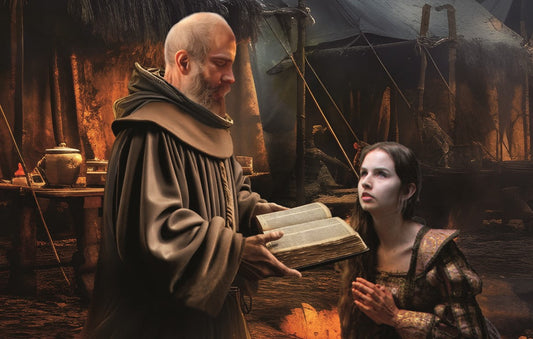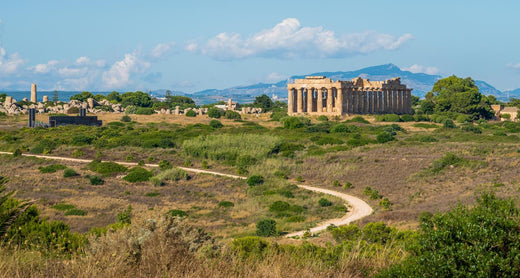Who doesn't wish for a secret recipe to achieve immortality? Since ancient times, people have strived to chase after mysterious and mystical books that exude a promising aura. There's certainly some truth to this, as a thrilling story from the Middle Ages now reveals...
Since 2021, Mecklenburg-based author Siebo Woydt has been writing historical adventure novels and crime stories. In his homeland, he is always on the trail of history's secrets. In his new novel "The Temptation of Immortality" he tells a gripping story about the search for eternal life.
Without giving too much away, he agreed to an interview on the occasion of the publication of his novel.
With your new novel, "The Temptation of Immortality," you enter the exciting and mythically shrouded era of the medieval quest. What is your story about?

The historian Bellstedt is called to a construction site in the basement of a Braunschweig monastery and discovers a lost medieval manuscript. He immediately identifies it as the most dangerous book in the world, as he recognizes the handwriting of the person who wrote it. With the manuscript, he retreats to the solitude of a Mecklenburg village in the middle of the forest and there investigates the mystery of the text: It is the travelogue of the monk Mamertus, who in 1189 traveled from the Harz Mountains to Dargun in Mecklenburg to find and destroy a specific book; this ancient book is said to contain the secret of immortality. The monk's mission overlaps between ecclesiastical and secular interests, so he is accompanied by a knight.
There are two narrative strands in my book. In one, we follow the historian's decipherment of the medieval manuscript and his time in the village of Tüwkow-Ausbau, during which he is harassed and confronted with superstition. In the second, we experience the monk's medieval journey, with all its perils, alongside his work, until Mamertus finally holds the Book of Immortality in his hand and is forced to perform the ritual.
What significance does the quest have as a literary motif in your book?
The quest is an ancient narrative structure for conveying heroic tales. We know it primarily from medieval texts, such as the legends of the Knights of the Round Table and their quest for the Holy Grail: A hero is given a mission and must achieve a goal against all dangers and obstacles, experiencing maturity and purification in the process. It was therefore clear early on that this narrative form, actually the forerunner of all adventure novels, was particularly well-suited for an exciting story from the Middle Ages. I have only adapted it to the extent that, in addition to the typical heroic figure (the knight Utz von Bärklingen, who accompanies the monk Mamertus and is dedicated to the chivalric ideals of his time), the main character is a reluctant hero. The Cistercian monk and scribe Mamertus is sent on this mission by his order without being consulted. The contrast between these two characters ensures that 'The Temptation of Immortality' is fraught with conflicts and diverging interests.
How can one imagine the historian Bellstedt's curiosity as the driving force behind the novel's plot?
Professor Bellstedt is a scholar at the University of Hamburg. He describes himself as "I teach comparative medieval studies." This isn't the usual material for a hero; in this role, he experiences his adventures at his desk. As soon as he recognizes the handwriting in which the medieval manuscript is written (a testament to his erudition and academic abilities), he understands the responsibility he now bears. He is even bold enough to take the manuscript and flee with it to a lonely and supposedly safe place deep in the Mecklenburg hinterland. Thus, alongside his academic interest, there is a high degree of personal concern in this mission. In a sense, he embarks on his own quest and falls under its influence. His quest mirrors the monk's mission in 1189; here, too, a man is searching for the contents of a dangerous book.
When you were writing the novel, was there something of your own desire for eternal life in it?

No, absolutely not. I think if we were immortal, we wouldn't do anything worthwhile with our time. We could postpone everything until tomorrow without feeling guilty.
Why does the story take place exactly during Easter 1189?
Spring is always a time of new beginnings and new beginnings. The group of travelers led by Mamertus and the knight must spend the cold winter in a monastery in the Harz Mountains before setting off into spring. For Mamertus, Easter is, of course, the climax of spring. On the other hand, Easter, as a festival of resurrection, provides a good backdrop for the theme of immortality, which is something like the eternal resurrection from the dead, the emancipation from death, so to speak. This addresses one of the reasons for the monk's mission: by attaining immortality, man would become equal to God, something the Church cannot allow, so the book containing the ritual of immortality must be destroyed.
What can the reader expect during the monk and the knight’s adventure?
There are many details about monastic and secular life of this period, including medieval cuisine. This second narrative thread, the journey of a monk, a knight, and their small entourage from the Harz Mountains to Dargun Monastery in the wilderness of Mecklenburg during the time of the first Christianization, can also be read as a medieval road movie. They encounter mistrust and rejection, meet lepers, place themselves in the hands of a local guide, are often forced to sleep outdoors, and are ambushed. And it becomes increasingly clear that the monk and the knight have very different expectations about the end of their journey.
Will the two of them manage to destroy the book?
The good news is that they find the book, and that Mamertus also succeeds in understanding it. But as an author, you must, above all, torment your characters. Six of them set out, and only one of them will make it home.
The interview was conducted by C. Leeck. Machine translated from German.
Wuppertal, February 2025.
Available in print or as an e-book here!
The book "The Temptation of Immortality" is available in bookstores and from our publishing house, as a printed book (ISBN 978-3-910347-67-0) and as an EPUB (ISBN: 978-3-910347-68-7).




